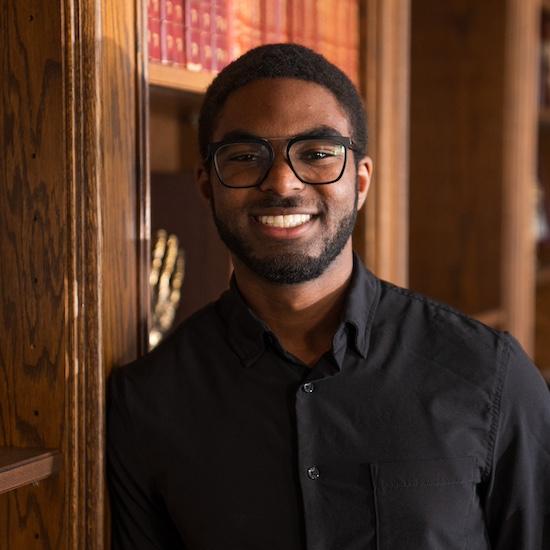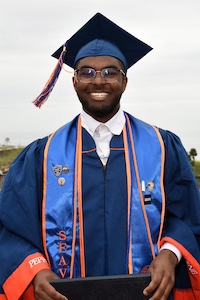Seaver Spotlight (Student Edition): Chase Jackson (‘25)

Chase Jackson (‘25) entered Pepperdine University’s Seaver College seeking a professional mentor. By the end of his time on campus, he’d not only found a guide capable of speaking into his life, but a new talent that will go on to inform his future. While completing his economics major, Jackson discovered an aptitude for debate, and he finished his senior year as the number two debater in the collegiate ranks.
Prior to graduating from Seaver College on May 3, 2025, Jackson sat down for a Q and A with the Seaver Newsroom that retraces his steps as an undergraduate, as a debater, and as a dreamer.
Q: What was your dream growing up?
Jackson: I've had a few different dreams. I grew up in Texas, where football is omnipresent, so early on I wanted to be an NFL player. My knees disagreed pretty quickly with that idea. I then became really impassioned about becoming an actor, but soon that changed and I wanted to be a mechanical or aerospace engineer. Prior to Seaver, my dream shifted again, and I decided to aim for commissioner of the NFL. I now aspire to have a career in which I'm always learning, always doing something new, always going somewhere interesting.
Q: What led you to Seaver College?
 Chase Jackson
Chase Jackson
Jackson: I took the advice of a peer and looked up the faculty at Pepperdine to see if someone there could potentially serve as my mentor. For me, that person was professor Ned Colletti. I found him on the website and noticed he was the former general manager of the Los Angeles Dodgers. At that moment, I thought, “I might never meet him, but let's go and give it a shot.” I ended up bumping into him on the second day of school. Now I serve as his teaching assistant. He’s been one of the single most influential figures in my life.
Q: What was a lesson you learned from professor Colletti?
Jackson: He taught me a memorable lesson on the first day of class. I was sitting in the back of the room when he told us that the class grade was based largely on participation. If you raised your hand, you’d likely earn a good grade. I approached him after class, and I said, “I don't know if I can compete in this class. I don’t know if I can ask the questions.”
He said, “Either you ask the questions, or you drop the course.” He then related how he used to sit in the back of class too. Professor Colletti taught me that no one is going to know what you know unless you tell them. After that I started asking questions and getting involved. I changed the way I spoke, stood, and even the way I dressed, trying to present myself as a more engaged person.
Q: How did you get started with the debate team?
Jackson: I was in professor Abi Smith’s speech class, and she encouraged me to join the debate team. I said, “no way.” She asked me two or three more times, and I said "no" every time. But eventually I changed my mind when my brothers pointed out that the competitions would give me a chance to travel while in school.
Q: What made you fall in love with the craft?
Jackson: A few things about debating are very appealing to me. My debate teammates are some of my favorite people. They're incredibly smart, and I enjoyed preparing with them and learning from them. I also liked devising case rebuttals in the heat of competition. Professor Smith got mad at me repeatedly because I tended to go off script. I’d write down a few notes and then dive in. But I think what I really love about debate is the curiosity it inspires in me.
This comes back to one of the lessons professor Colletti taught me. Throughout our discussions, he emphasized the importance of being curious and asking questions. Debate allowed me to practice these behaviors consistently. Debate is all questions. Either you’re asking your opponents questions, or you’re asking yourself questions, trying to figure out what research you need to do to prepare a winning argument.
Q: What’s it like to be the number two debater in the nation?
Jackson: It's extremely humbling, largely because the title doesn’t acknowledge all the people who helped me get here. It feels almost improper to claim it. In my mind, it belongs to every teammate and every person who nurtured my debate ability, particularly because I really struggled in the beginning.
My first debate ever, I was terrible. I performed so poorly that I easily lost the debate for our team. I stopped a few minutes early, and my notes were jumbled up. I didn't really know what I was saying. It was embarrassing. I went home that day, called the co-presidents of our British Parliamentary debate team with some strategy questions. I started with, “How do you take notes? I need to know how you take notes during the round in such a way that you can follow your own thoughts during the debate.” They gave me great advice, and I spent the rest of the night practicing what they taught me.
The next day I approached the judge that gave us the loss the day before, and I said, “I'm going to win today. I figured this out, and I'm going to win.” And we did. We won the round, and after that I began to understand how much preparation and research goes into a strong performance. I appreciate the grace my teammates gave me throughout that learning process.
Q: How do you expect to use your debate experience going forward?
Jackson: The debate team gave me my first leadership opportunity. Prior to becoming president of the civic debate team, I didn't feel that I had the qualities of a leader. Professor Smith reassured me that I did, and I’m grateful for her confidence in me that made all of this possible.
Q: What’s next for you after graduation?
Jackson: After graduation, I’ll be working for my brother's medical data startup. I'm still not sure what I want to do long term, but I'm trying to be fluid about it. My mom always says, “God loves to hit moving targets” So I’m trying to put myself in a position that, if an opportunity arises, I can take it, I can be ready for it.